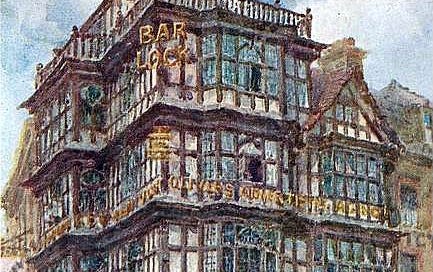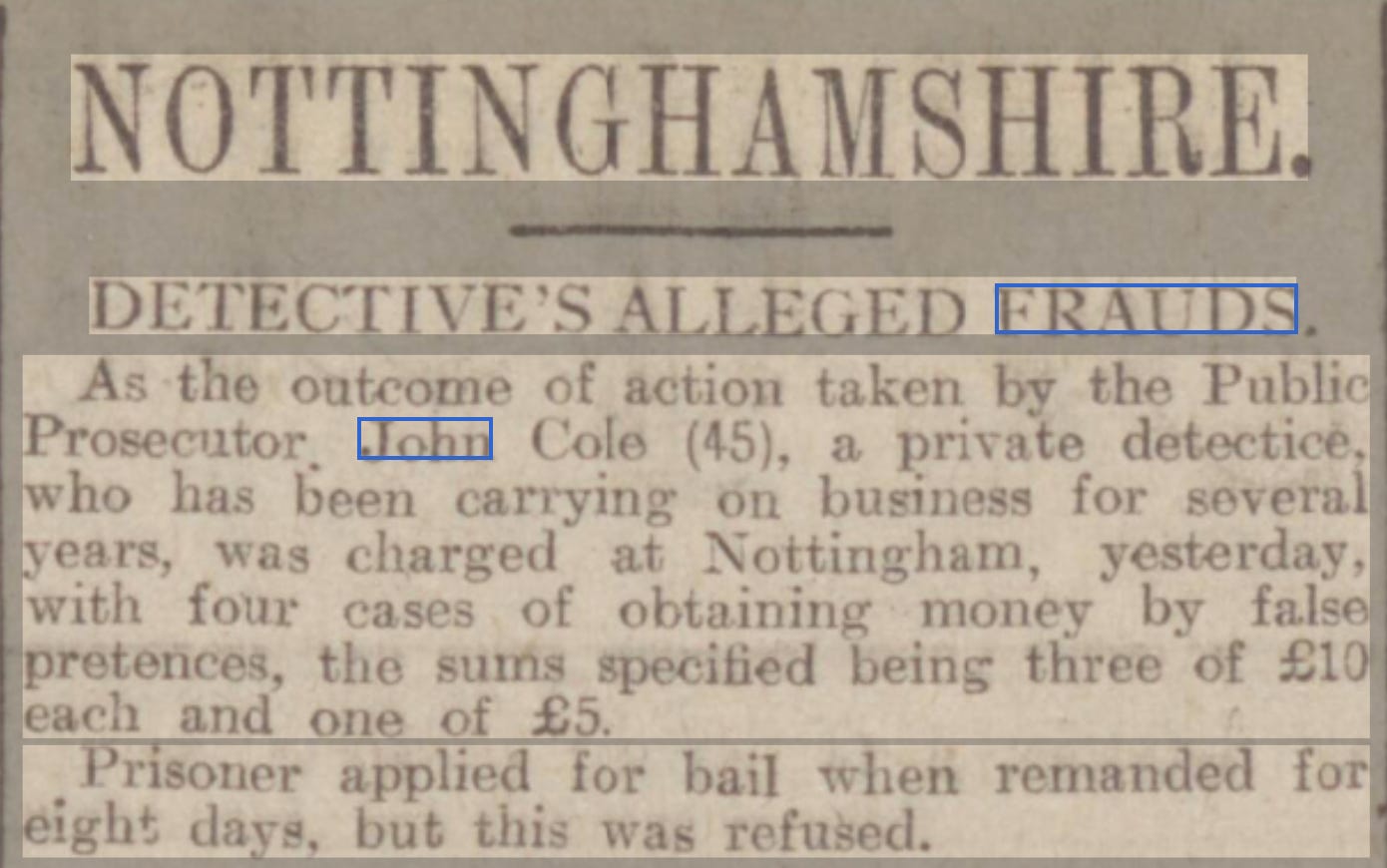Dale's Private Detective Agency
Was this Bristol agency all it claimed to be - and who was the 'former Pinkerton's detective' who ran it?
Bristol’s High Street
Dale's Private Detective Agency was a Bristol agency operating in the early 1920s. Based at 30 Broad Street in the city, the agency claimed to be run by a John Dale, with paperwork being issued in his name, although signed on his behalf by another staff member. The agency was different to others in that it did not restrict itself to the usual detective matters, but also lent money to clients. It certainly succeeded in getting those clients, although they were unlikely to be satisfied with results.
Alice Beaumont certainly wasn't happy. A miner's wife from Newark in Nottinghamshire, her husband had lost his job and left home in search of work in 1922. In his absence, his mother died, leaving money in her will to her son. Alice could not get in touch with her husband to tell him, and so she had come to Bristol and contacted Dale's Agency to get them to locate him. The agency certainly succeeded in finding him, and got him to write a letter authorising Alice to receive the money from the will on his behalf. However, although they paid bits and bobs of money to her, she never received the balance. She therefore took her case to the police.
The police were already aware of the man behind Dale's. His name was not Dale, however, but John Mawby Cole. Two weeks before Mrs Beaumont's case was due to be heard at Bristol Police Court, he had pleaded guilty to two offences under the Business Names Act of 1916. These offences related to the fact that he had established Dale's Private Detective Agency, but had failed to register it in his own name - he had instead claimed the agency was founded and run by John Dale. Evidence submitted to court included the fact that he had sent out letters signed 'pp J. Dale' to a potential female client, who turned out to be a member of the Bristol police force.
Cole duly failed to turn up at court for Alice Beaumont's case, charged with fraud. However, his misdeeds caught the interest of the John Bull newspaper, which started to investigate the man. It described him as a man who was 'a private detective, very private indeed, and the most private thing about him is his post'. It had been drawn to Cole as a result of his debt-collecting activities, as a reader had contacted the paper regarding a debt he had incurred a year earlier.
He had a shock when he suddenly received a letter from Dale's demanding repayment of the debt, threatening him with a debt collector (he would have "'Debt Collector' on his hat and coat, and all the people in the street will know what he is calling for"). Understandably, the man was terrified, and got in touch with the paper, whose staff believed this was blackmail. It then started investigating the man behind the agency, and duly reported his charges under the Registration of Business Names Act, which had resulted in him being fined £2 10s.
John Bull's investigations scared Cole, and resulted in a follow-up piece, where the paper described him as 'the shy Sherlock Holmes...[who] was evidently scared by the beams of our searchlight'. After the publication of the exposé on him, he was due in court in relation to Alice Beaumont's case. He failed to turn up, and a warrant was issued for his arrest.
Coverage of one of Cole’s previous offences, from the Sheffield Daily Telegraph of 8 November 1917 (via British Newspaper Archive)
As John Bull and the police realised, John Mawby Cole had a long history of financial misdeeds. He was a bankrupt - having been made so in about 1899 - and had served at least two prison sentences. He had served 12 months hard labour in 1906 after being convicted of fraud at Liverpool Assizes; then, in 1917, he was sent back for 14 months hard labour after a similar conviction in Nottingham.
He was also something of a Walter Mitty. He had informed his solicitor that he had started his career in a solicitor's office, before emigrating to America and 'entering the service of Pinkerton’s, the well-known detective agency, and was employed at Detroit and on the Mexican Railway in detective work'. Many a detective could get kudos by claiming a link to Pinkerton's famous agency, but it was usually an untrue claim, as it was in Cole's case.
He was actually an agricultural labourer's son from Hockwold in Norfolk. He had married Elizabeth Moore in early 1889, and taken on the job of innkeeper at the Rising Sun Inn in Castle Acre. He then moved his wife and young family to Ipswich, where he allegedly worked as an accountant and auctioneer until being made bankrupt, at which point he moved to Colchester in Essex, describing himself in the 1901 census as an insurance broker.
“A man of ability who had been living not honestly but by his wits” - trial report, Manchester Times, 24 February 1906
Then came a move to Manchester, where the Coles' youngest child was born in 1903. In 1906 came the sojourn at His Majesty's Pleasure after his Liverpool trial (he was described at the Assizes as being ‘a man of ability who had been living not honestly but by his wits’) and on his release, the family moved again, this time to Nottingham. The 1911 census form was filled in by John, who said he was a general commission agent working 'for anyone'. He seems to have remained in Nottingham for all this decade, first establishing his detective agency in this city, with a spell in prison again midway through. He then moved to Bristol in 1923, perhaps feeling that too many people - disgruntled clients? - were catching up with him in Nottingham.
By the time of his Bristol offences, John Mawby Cole was in his late 50s, a father of five, with a habit of moving round the country every time his misdeeds got uncovered. Yet there is no sign that he learned from his arrests and convictions - he couldn't resist trying to make money from other people's misfortunes. Unfortunately, in doing so, he increased people's existing suspicions about private detectives, and gave the profession a bad name.





